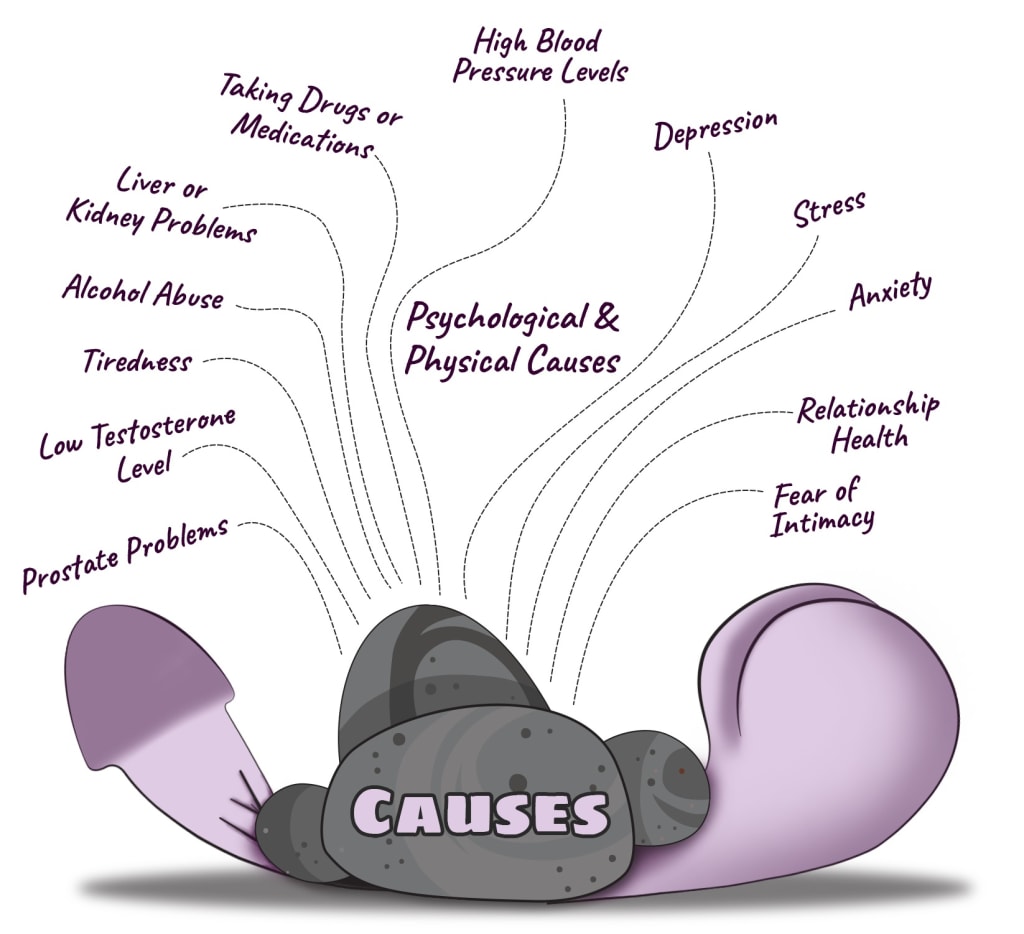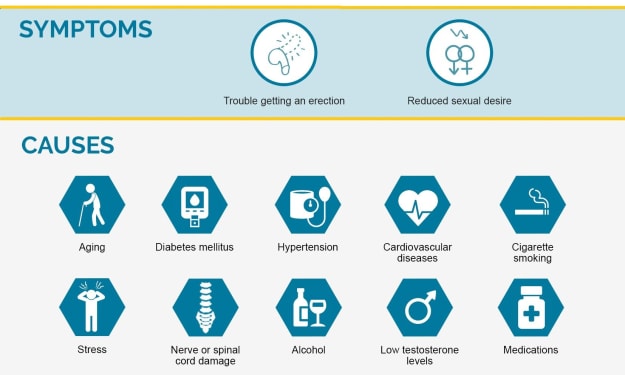What Causes Erectile Dysfunction
Causes of Erectile Dysfunction

Introduction:
Erectile dysfunction (ED) is a condition that affects many men, causing difficulties in achieving or maintaining an erection. It can have a significant impact on a person's self-esteem, relationships, and overall quality of life. While ED can be frustrating, it is essential to understand its causes in order to seek appropriate treatment. In this blog post, we will explore the various causes of erectile dysfunction, including physical and psychological factors, addictions, medication side effects, and age-related factors, and debunk some common myths surrounding its causes.
How Common Is Erectile Dysfunction?
According to studies, it affects approximately 30 million men in the United States alone. It is important to note that ED can occur at any age, although it becomes more prevalent as men get older. By understanding the causes of this condition, we can work towards effective treatment and support.
Physical Causes of Erectile Dysfunction:
Erectile dysfunction can be attributed to various physical factors. Here are some common physical causes:

Medical Conditions: These include cardiovascular diseases, diabetes, high blood pressure, obesity, and metabolic syndrome. These conditions can affect blood flow and nerve function, impeding the normal erectile process.
Nerve-damaging Pelvic Injury: Injuries that damage the nerves in the pelvic area, such as those resulting from accidents, surgeries, or radiation therapy, can interfere with the transmission of signals necessary for achieving an erection.
Hormonal Disruption: Hormonal imbalances, particularly low testosterone levels, can contribute to erectile dysfunction. Testosterone is an important hormone for sexual function, and a decrease in its levels can affect erectile function.
Call our in-house expert at Dr. Arora Clinic to discuss your concerns and explore treatment options tailored to your needs.
Psychological Causes of Erectile Dysfunction:
In addition to physical factors, psychological causes can also play a role in erectile dysfunction. Here are a few examples:
Stress and Anxiety: High levels of stress, anxiety, or work-related pressure can interfere with the sexual response cycle, making it difficult to achieve or maintain an erection.
Depression: Depression can affect libido and overall sexual desire, leading to difficulties in achieving erections.
Relationship Problems: Conflicts, communication issues, or unresolved relationship problems can contribute to ED. Emotional distress within a relationship can manifest as physical symptoms, including erectile difficulties.
Can Addictions Cause Erectile Dysfunction?
Yes, addictions can contribute to erectile dysfunction. Substance abuse and addiction can have detrimental effects on sexual function. Here are a few types of addictions that can cause or worsen ED:
Alcohol Abuse: Excessive alcohol consumption can impair neurological function, affect hormone levels, and disrupt blood flow, leading to erectile difficulties.
Drug Abuse: Illicit drug use, including cocaine, marijuana, and opioids, can interfere with the normal erectile process and cause erectile dysfunction.
Smoking: Smoking damages blood vessels, reduces blood flow, and increases the risk of developing cardiovascular diseases, all of which can contribute to ED.
What Medications Could Cause Erectile Dysfunction?
Certain medications have been associated with erectile dysfunction as a potential side effect. These include:
Antidepressants: Some antidepressant medications, such as selective serotonin reuptake inhibitors (SSRIs), can affect sexual function and contribute to erectile difficulties.
Blood Pressure Medications: Certain medications used to treat high blood pressure, such as beta-blockers and diuretics, may cause or worsen erectile dysfunction.
Antihistamines: Some antihistamines used to manage allergies can have a drying effect on the body, including the genitals, potentially leading to erectile problems.
Is Medication-Induced Erectile Dysfunction Permanent?
Medication-induced erectile dysfunction is not always permanent. In many cases, once the medication is discontinued or adjusted under the guidance of a healthcare professional, erectile function may improve. It is important to consult with a doctor before making any changes to medication regimens.
What Is Age-Related Erectile Dysfunction?
Age-related erectile dysfunction refers to the natural decline in erectile function that occurs as men get older. As men age, there is a gradual decrease in testosterone levels, increased prevalence of underlying health conditions, and changes in blood vessel health, all of which can contribute to erectile difficulties. However, it is important to note that aging alone does not guarantee the development of erectile dysfunction, and many older men continue to have satisfying sexual relationships.
Myths vs. Facts: Causes of ED:
There are several myths surrounding the causes of erectile dysfunction. Let's debunk a few:
Myth: Erectile dysfunction is solely caused by psychological factors.
Fact: While psychological factors can contribute to ED, physical causes are also common, including medical conditions, nerve damage, and hormonal imbalances.
Myth: Only older men experience erectile dysfunction.
Fact: ED can affect men of all ages. While it is more prevalent in older men, younger men can also experience erectile difficulties due to various factors.
Myth: Erectile dysfunction is a normal part of aging.
Fact: While age-related factors can contribute to ED, it is not an inevitable part of aging. Many older men maintain healthy sexual functions with appropriate care and management.
Key Takeaways:
Erectile dysfunction can have physical and psychological causes. Medical conditions, nerve damage, hormonal imbalances, stress, and relationship problems can contribute to ED. Addictions, such as alcohol abuse and drug use, can worsen erectile dysfunction. Certain medications, including antidepressants and blood pressure medications, may have ED as a side effect. Medication-induced ED is often reversible upon discontinuation or adjustment of medications. Age-related factors can contribute to erectile difficulties, but aging alone does not guarantee the development of ED. Debunking common myths about the causes of ED helps promote understanding and proper treatment.
Still, have concerns? Book an appointment at Dr. Arora Clinic to discuss your specific situation and explore personalized erectile dysfunction treatment options to address erectile dysfunction.
Frequently Asked Questions:
- Can stress cause erectile dysfunction?
- Are there any natural remedies for erectile dysfunction?
- Can obesity contribute to erectile dysfunction?
- Can diabetes cause erectile dysfunction?
- Is erectile dysfunction hereditary?
- Can cycling cause erectile dysfunction?
- Can high cholesterol lead to erectile dysfunction?
- Can psychological therapy help with erectile dysfunction?
- What is the success rate of treatments for erectile dysfunction?
- Can erectile dysfunction be a sign of heart disease?
Answers to these questions:
- Yes, stress can contribute to erectile dysfunction by affecting the sexual response cycle and increasing performance anxiety.
- While some natural remedies may have anecdotal evidence of effectiveness, it is important to consult with a healthcare professional before trying any alternative treatments for erectile dysfunction.
- Yes, obesity can contribute to erectile dysfunction by affecting blood flow and hormone levels in the body.
- Yes, diabetes can damage blood vessels and nerves, leading to erectile dysfunction.
- While there may be a genetic predisposition to certain conditions that contribute to erectile dysfunction, it is not solely hereditary.
- Prolonged or intense cycling can put pressure on the nerves and blood vessels in the pelvic area, potentially leading to temporary erectile difficulties.
- High cholesterol can contribute to erectile dysfunction by affecting blood vessel health and impairing blood flow.
- Yes, psychological therapy, such as cognitive-behavioral therapy or psychosexual counseling, can help address underlying psychological factors contributing to erectile dysfunction.
- The success rate of treatments for erectile dysfunction varies depending on the individual and the chosen treatment option. Consultation with a healthcare professional can provide personalized information regarding success rates.
- Yes, erectile dysfunction can be a potential early sign of heart disease. Both conditions often share risk factors, such as high blood pressure and poor blood vessel health.
- Remember, the information provided here is for educational purposes only, and it is always best to consult with a healthcare professional for personalized advice and guidance regarding your specific situation.
About the Creator
Pawan Kumar
Pawan help peoples suffering from erectile dysfunction and provide information about permanent treatment for erectile dysfunction from expert sexology doctors. For Information Visit: https://www.draroras.com/erectile-dysfunction-treatment






Comments
There are no comments for this story
Be the first to respond and start the conversation.